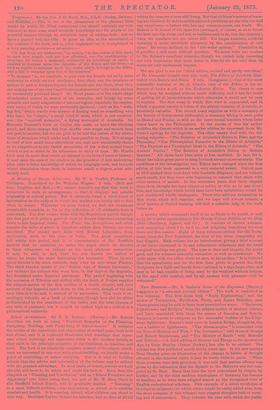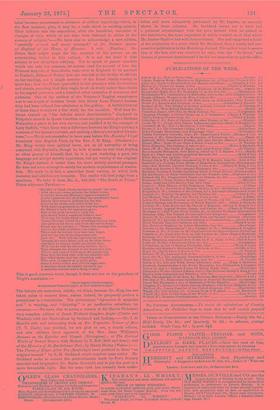Nita' Enrrross.—Mr. S. Smiles's Lives of the Engineers (Murray) reappears
in " a new and revised edition." The work is contained in five volumes. The first deals with "Early Engineering," and the names of Vermuyden, Myddleton, Perry, and James Brindley, men whose genius may be said to have been exercised on water. "Harbours, Lighthouses, and Bridges," form the subject-matter of another volume, and have associated with them the names of Smeaton and Rennie. Smeaton is known to everyone as the successful builder of the Eddy- stone lighthouse ; Rennie's fame rests on London Bridge, though he, too, was a builder of lighthouses. "The Steam-engine " is connected with the lives of Boulton and Watt, " The Locomotive " with those of George and Robert Stephenson, and " The History of Roads " with Metcalfe and Telford.—A third edition of Sermons and Essays on the Apostolical Age, by Dean Stanley (James Parker), has also to be noticed. The volume was first published nearly thirty years ago. In his new preface Dean Stanley gives an illustration of the change in habits of thought effected in this interval which it may be worth while to quote. " When these sermons were first preached, it was said that serious offence was given by the intimation that the Epistle to the Hebrews was not com- posed by St. Paul. Since that time the view entertained by Origen, by Luther, and by the chief modern theologians of Germany has become so familiar, as to have been adopted almost as the recognised view of English ecclesiastical scholars. This example of a silent revolution of theological judgment (to which others might be easily added even from the short compass of this volume) may suggest thoughts both of warn- ing and of reassurance. They indicate the ease with which the public mind becomes accustomed to advances of critical knowledge which, in the first instance, give, it may be, a rude shock to existing opinion. They indicate also the superficial, often the beneficial, character of changes of view, which at one time were believed to strike at the essence of religion."—We have also to acknowledge a new edition, " carefully revised and much enlarged," of Dr. Doran's Queens of England of the House of Hanover. 2 vols. (Bentley.) Dr. Doran finds ample scope for the exercise of his powers as an entertaining writer in this subject. It is not his fault if that subject is not altogether edifying. Not to speak of graver scandals which are only too common, let anyone read the account of how the Princess Augusta of Saxe-Gotha came over to England to be married to Frederic, Prince of Wales; how she was left to the civility of officials on her landing, not a single member of the Royal family coming to meet her ; how the Prince quarrelled in her presence with his brothers
7 and sisters, asserting that they ought to sit on stools rather than chairs in his august presence, and a hundred other examples of meanness and rudeness. One of the earliest of the Princess's English experiences was to see a mob of footmen break into Drury Lane Theatre because they had been refused free admission to the gallery. A faithful history of these times is anyhow a fine study for the moralist. Well does Dr. Doran remark on "the infinite moral discrimination" displayed in Walpole's remark to Queen Caroline, when she proposed to give Madame Walmoden a place in her own service, and justified it by the example of Lady Suffolk, "that there was a difference between the King's making a mistress of the Queen's servant, and making a Queen's servant of his rais- tress."--We do not remember to have seen before The 21;neid of Virgil translated into English Verse, by the Rev. J. M. King. (Stanford.)— Mr. King writes very spirited verse, not at all unworthy of being compared with Dryden's, though he fails to make us feel what Dryden so often proves of himself, that he is a poet rendering a poet, into language not always strictly equivalent, but yet worthy of the original. Mr. King's rhetoric is better than his more strictly poetical passages. He does not even attempt to satisfy the modern requirements of transla- tion. His work is, in fact, a somewhat loose version, in which both omission and addition are frequent. The reader will best judge from a specimen. We take it from .7En. ii., 535-558, "The Death of Priam." Priam addresses Pyrrhus :-
"Shedder of blood, whose barbarous wrath," he cries, " With the son's corse pollutes the father's eyes, If mortal woes can Heaven's regard command, Jove's righteous bolt shall blast the murderer's band. Falsely thou boaarat Achilles for thy sire,
Great in his deeds, and noble in his ire; With heart as generous as his soul was brave,
He Hector's body for interment gave ; Safe to his gods restored a royal foe, And sacred held a suppliant father's woe." With this 'his feeble hand a javelin flung; 'Gainst Pyrrhus' shield the trembling weapon rung. Just pierced the brass, and from the centre hung. Fierce was his answer :—" Thine own message bear,
And to the shade of Peleus' sou repair;
There end the lecture thou best here begun, And tell the sire of his degenerate eon. Now die." With this the aged sire he drew Through his son's blood, and on the altar threw. One band he twined within his silvery hair,
With one he laid the thirsting faichion bare;
Then plunged the weapon in the monarch's side, Whose soul rushed forth upon the purple tide. Thus died the king who wept his country's fall, Her rifled altars, and her crumbling wall ; Who once, in empire as in glory great, Sward Asia's tribes, and rul'd in regal state. A headless trunk the mighty monarch lay, A nameless carcase and a thing of clay.'
This is good, sonorous verse, though it does not rise to the grandeur of Virgil's conclusion :—
"Jacet inputs littore truncus, Avolsumque humeris Caput, et sine nomine corpus."
The defects are numerous, chiefly, we think, because Mr. King has not taken pains to remove them, unless, indeed, he purposely prefers a paraphrase to a translation. The picturesque " lapsantem in sanguine nati " is wanting, and " thirsting " is an ineffective substitute for coruscum.—We have also to notice a reissue of Sir Harris Nicholas's very complete edition of Izaak Walton's Complete Angler (Chatto and Windus), with the illustrations by Stothard and Inskipp.-31r. J. B. Heard's able and interesting book on The Tripartite Nature of Man (T. T. Clark) has reached, we are glad to see, a fourth edition, and new editions have appeared of the Rev. Isaac Williams's Sermons on the Epistles and Gospels (Rivingtons); of The Poetical Works of Samuel Rogers, with Memoir by E. Bell (Bell and Sons); and of the Memoirs of St. Bartholemew Fair, by Henry Morley (Warne.)— The Poems of Edgar Allan Poe (Routledge) have prefixed to them " an original memoir" by R. H. Stoddard which requires some notice. Mr. Stoddard seeks to correct the misstatements made by Poe's literary executor and biographer, Dr. Rufus Griswold, and to put the poet in a more favourable light. But the same task has recently been under-
taken and more adequately performed by Mr. Ingram, as recently shown in these columns. Mr. Stoddard seems not to have had a personal acquaintance with the poet, beyond what ho gained at two interviews, the more important of which reminds us of that which Mr. Justice Shallow had with John of Gaunt. Poe had suggested a doubt of the originality of a poem which Mr. Stoddard, then a youth, had pro- posed for publication in the Broadway Journal. The author went to assure him of the fact, and was received, he says, with the "lie direct," and threats of personal chastisement if he did not immediately quit the office.







































 Previous page
Previous page